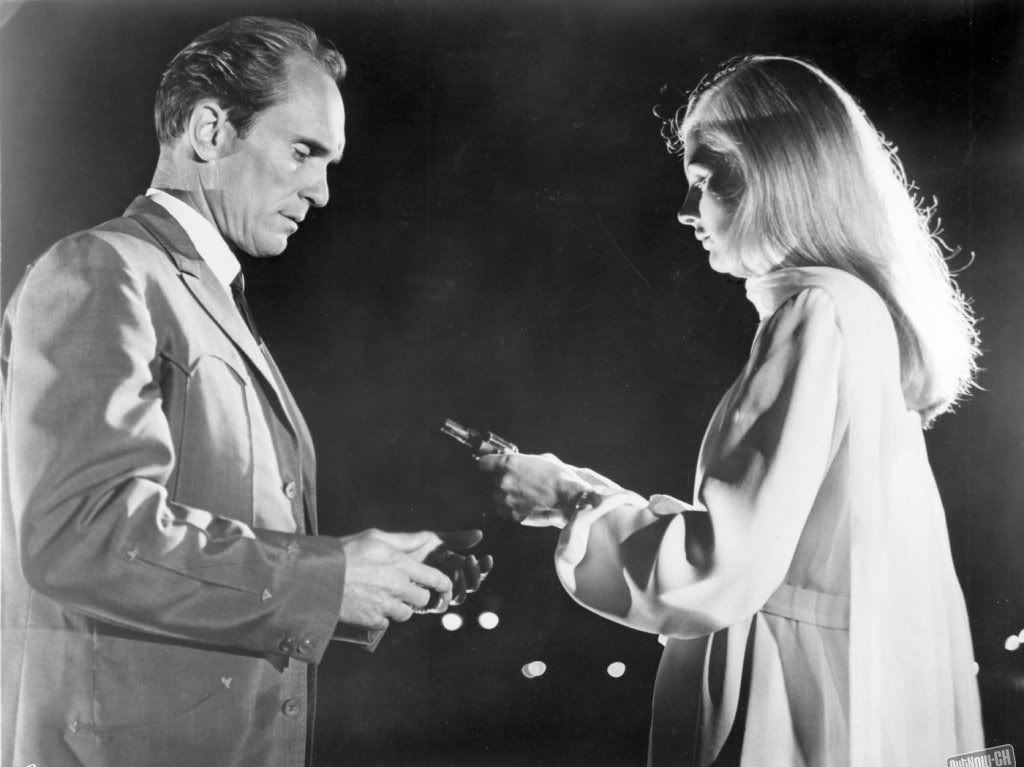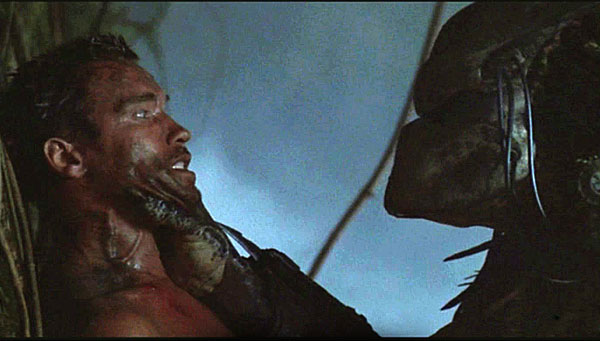6) Darth Vader strikes down Obi-Wan Kenobi (Star Wars)
 In his book Empire Building, Garry Jenkins reveals that Lucas’ original script called for Ben Kenobi to make a narrow escape with his protégés after holding his former apprentice, Darth Vader, at bay. Actor Alec Guinness, who played Kenobi, balked on the grounds that the young heroes would have to drag a wounded man around for the rest of the movie.
In his book Empire Building, Garry Jenkins reveals that Lucas’ original script called for Ben Kenobi to make a narrow escape with his protégés after holding his former apprentice, Darth Vader, at bay. Actor Alec Guinness, who played Kenobi, balked on the grounds that the young heroes would have to drag a wounded man around for the rest of the movie.It seems surprising that Guinness, a Benedictine Oblate, only saw the issue in practical terms. Star Wars drew on many mythologies, including early Christianity. Consider: Kenobi has fought Vader to a virtual draw, but when he sees the heroes sprinting past the guards for their ship, he raises his sword and awaits the killing blow. “Greater love hath no man than this...”
7) Rosalie shoots “Killer” Gannon to protect her father (The Rain People)
 Young Marya Zimmet never acted onscreen after Francis Ford Coppola’s strange Frenchified American art film. Coppola calls this one of his favorites of his own movies, yet few have ever seen it. Newly released on DVD-R, it’s clearly dated but endures remarkably well.
Young Marya Zimmet never acted onscreen after Francis Ford Coppola’s strange Frenchified American art film. Coppola calls this one of his favorites of his own movies, yet few have ever seen it. Newly released on DVD-R, it’s clearly dated but endures remarkably well.Rosalie (Zimmet) antagonizes her abusive, ethically spongy cop dad Gordon (Robert Duvall) with whom she shares a trailer, and only increases when he brings home disaffected housewife Natalie (Shirley Knight). Natalie needs the intimacy, but for Gordon, sex—like everything else in life—is about misplaced aggression.
Brain-damaged ex-quarterback “Killer” Gannon (James Caan) sees the sex turn rough (is it rape? The film equivocates) and tries to rescue Natalie. The men trade blows, but as they approach a stalemate, Rosalie shoots Gannon with her father’s service pistol. As Natalie drags Gannon, possibly dead, through the mud, tearfully confessing her love, the movie suddenly ends.
8) A monkey discovers he can smash things with a bone (2001: A Space Odyssey)
 Stanley Kubrick and Arthur C. Clarke, both agnostics, nevertheless could not accept that life lacked a motivating factor. Things couldn’t just happen, they reasoned; they demanded a cause. So they looked beyond the stars. When we made the leap from Australopithecine to human, they make aliens the proximate cause.
Stanley Kubrick and Arthur C. Clarke, both agnostics, nevertheless could not accept that life lacked a motivating factor. Things couldn’t just happen, they reasoned; they demanded a cause. So they looked beyond the stars. When we made the leap from Australopithecine to human, they make aliens the proximate cause.This classic scene reflects the belief, common in 1968, that humanity gained its identity through war and weapons. Sociologists now believe human culture arose out of agriculture. But as a prelude to the highly conflicted story that follows, this image sets the scene that humanity was born in a moment of aggression.
9) Dutch challenges the Predator (Predator)
 After Schwarzenegger's mechanically laconic role in the tech-noir Terminator, Dutch seems a diametrically opposed role: talkative, sweaty, principled. And this whole movie has a humid organic atmosphere, which amplifies this film’s reversal theme. While the Predator initially has the soldiers at its mercy, its technology gradually degrades, and it finds itself on equally organic footing with its human adversary.
After Schwarzenegger's mechanically laconic role in the tech-noir Terminator, Dutch seems a diametrically opposed role: talkative, sweaty, principled. And this whole movie has a humid organic atmosphere, which amplifies this film’s reversal theme. While the Predator initially has the soldiers at its mercy, its technology gradually degrades, and it finds itself on equally organic footing with its human adversary.When Dutch swipes mud off his shoulders and disbelievingly whispers “He can’t see me,” we feel with him the realization. This monster is utterly reliant on its machines; the more of its machines fail, the less of a fighting chance it has. Sure, it’s strong. Sure, it’s crafty. But when Dutch’s scream and his exploding arrows announce his challenge, we know we will finally see a heroic contest of equals.
10) Theo can’t save Julian (Children of Men)
 Theo Faron (Clive Owen) hasn’t yet accepted his ex-wife Julian Taylor’s (Julianne Moore) job offer, nor does he realize what profound odds he faces. He only knows she’s implied he might be rewarded with renewed romance. The old flames are demonstrating their old trick, blowing a ping-pong ball between their mouths, when an angry mob attacks; one well placed shot pierces Julian’s jugular vain. On the run as fugitives, they can’t even bury her.
Theo Faron (Clive Owen) hasn’t yet accepted his ex-wife Julian Taylor’s (Julianne Moore) job offer, nor does he realize what profound odds he faces. He only knows she’s implied he might be rewarded with renewed romance. The old flames are demonstrating their old trick, blowing a ping-pong ball between their mouths, when an angry mob attacks; one well placed shot pierces Julian’s jugular vain. On the run as fugitives, they can’t even bury her.Joseph Campbell would call this “Crossing the First Threshold,” the point where the hero steps outside normal limits and faces the profound unknown. But this is a religious allegory and, like Isaiah or the Buddha, Theo can only become a carrier for the truth when the vestiges of his old life have passed away. Bit by bit, Theo loses his job, his home, his love, and his last remaining friend. Only then is he free to face the task before him.
No comments:
Post a Comment